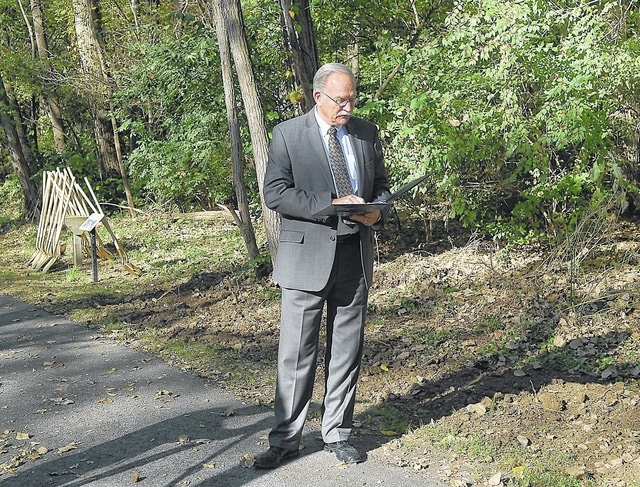
SIDNEY — A project that’s been many years in the making got its official start Wednesday morning when ground was broken for a pipeline that will provide Sidney with a new source of water.
City and county officials and contractors gathered at the end of the Canal Feeder Trail behind Graceland Cemetery. The pipeline will bring water from wells in Washington Township to Sidney.
The 30-inch transmission line will extend from Sidney more than 7.5 miles to the well field near Lockington.
“As I prepared my remarks for the occasion, I thought about paraphrasing the Bible and liken the length of time it has taken to find a water source to the time the Jews wandered in the desert seeking the promised land — then realized that our search has taken longer than 40 years!” Sidney Mayor Mike Barhorst said in his opening remarks at the groundbreaking.
The “four score and seven years ago” of the Gettysburg Address “was just a bit too long — so I am contenting myself with simply saying that for many years, our city has been searching for a water supply — one that would provide reliability in times of drought — one that would not be subject to surface contamination — one that would sustain both residential and industrial consumers over the next century,” Barhorst said.
The city of Sidney’s search for water dates to before Barhorst’s first terms on City Council in the late 1970s through the ’80s, he said. One idea was to dam the Great Miami River, flooding Port Jefferson, and creating an up-ground reservoir.
“That idea was initially praised, then nixed by the Army Corps of Engineers when they discovered the presence of Glen Cemetery, and decided that the removal of the many graves there would prove to be a major undertaking — no pun intended,” Barhorst said.
The search wasn’t a constant one, but a major drought in 1988 found the city “within just a couple of days of having to shut down industry,” Barhorst said.
“That experience left a lasting impression on me, and certainly helped lead to the water source being one of the major goals to be pursued by the city during what I will refer to as my current tour of duty,” he said.
“Imagine calling Cargill, a company that has chosen to build the world’s largest soybean-processing plant in Sidney, and telling them that they had to cease operations — and then telling them that you had no idea when they could resume operations because it would have to rain — a lot!” Barhorst said. Similar calls would have to be made to the many other industries in Sidney. “The economic impact to families, corporations and to the community would be catastrophic,” he said.
With the new water source, Sidney will no longer be solely dependent on surface water, Barhorst said. He also mentioned water contamination that has plagued Toledo and other cities.
“In my view, the well field project may be the most important infrastructure investment the community has ever made,” Barhorst concluded.
Shelby County Commissioner Tony Bornhorst also spoke briefly at the event. He congratulated the city on the project, saying it is important for the city and the county. He said the improvements “will continue to keep Sidney and Shelby County on top of the business world here on I-75.”
The city awarded the contract to Howell Contractors to construct the transmission line for about $13.7 million. Peterson Construction was the low bidder for the well field work at about $7.5 million.
The city has been acquiring land for the project, some by eminent domain.
In June 2014, Washington Township Trustees, Spring Creek Corp. and Barrett Paving Materials (owner of Spring Creek) filed a civil suit in Shelby County Common Pleas Court against the city of Sidney.
In the lawsuit, Barrett said the city should compensate it for the land and mineral deposits on the property should the city obtain the property through eminent domain. Washington Township said in the suit that should the city establish wells in the area, the water remaining in the aquifer would not be sufficient to meet the needs of township residents. The township has an easement with Barrett for the aquifer. The city had earlier conducted informal negotiations with Barrett to purchase the property, according to the suit.
According to court records, the latest filing in the case was to set a telephone scheduling conference for Oct. 19.




